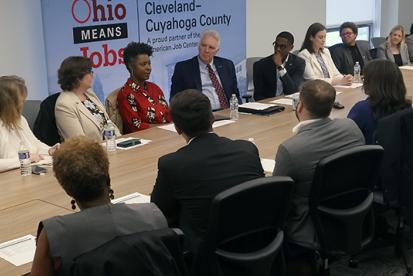Tuesday, Nov. 29, 2022 — Cleveland — An interdepartmental team from police, public safety, city council, and the Mayor’s Office of Prevention, Intervention & Opportunity, will join leaders from the Cleveland Foundation at the Medical College of Wisconsin today to learn more about its Violence Response Public Health and Safety Team (VR-PHAST).
VR-PHAST is the city’s largest cross-sector collaboration working to break the cycle of gun violence in the city. Improving coordination of violence prevention efforts was a priority called for by the community in Milwaukee’s Blueprint for Peace, a unifying vision and overarching plan to advance community safety and wellbeing.
“We are grateful for the partnership of peer cities like Milwaukee as we develop our long-term plan for violence prevention in Cleveland,” said Mayor Justin M. Bibb. “While there is no one-size-fits-all solution, there is a lot we can learn from cities that have strong, actionable, community-driven plans like the Blueprint for Peace.”
The planning process for Milwaukee’s Blueprint launched in fall of 2016 and coincided with a steady four-year decline in homicides and non-fatal shootings in the city according to data from the Medical College of Wisconsin’s Homicide Review Commission Dashboard. The Blueprint was designed to take a public health approach to reducing violence in Milwaukee—one that would address the underlying factors that contribute to violence, build on community assets, and culture, and systematically apply data to ensure effective focus and solutions.
Following a 10-month planning process, the resulting Milwaukee Blueprint for Peace is a community-driven agenda for addressing the complex factors that drive violence. Rooted in a public health approach to violence prevention, the Blueprint was shaped by more than 1,500 individuals, elevating the voices of youth, community residents, and key stakeholders to call for strategic, aligned, and sustained investments and action to prevent violence, build resilience, and create a safer, healthier city.
“We are pleased to be partnering with Cleveland and applaud the work that city, safety, and foundation leaders are doing to identify promising practices in similar communities,” said Reggie Moore, Director of Violence Prevention Policy and Engagement at the Medical College of Wisconsin Comprehensive Injury Center. “Improving the safety and wellbeing of youth, families, and neighborhoods requires us to work collaboratively to advance violence prevention as a public health priority in cities across the nation.”
In October, the U.S. Department of Justice awarded Cleveland a $2 million grant under the Community Violence Intervention and Prevention Initiative (CVIPI) for a community wide, long-term violence intervention program. The meeting in Milwaukee will advance the work on Cleveland's CVI plan, including the strategy for launching the public process and other key activities.
“Over the last few months, the Comprehensive Injury Center has been supporting Cleveland and other cities apart of the Community Foundations Leading Change (CF Leads) Gun Violence Prevention Network,” said Cleveland’s Chief of Youth & Family Success Sonya Pryor-Jones. “We look forward to learning more about the Blueprint for Peace and other programs and to exploring how they might inform our own comprehensive approach to community safety.”


